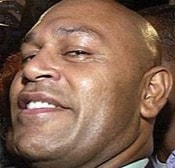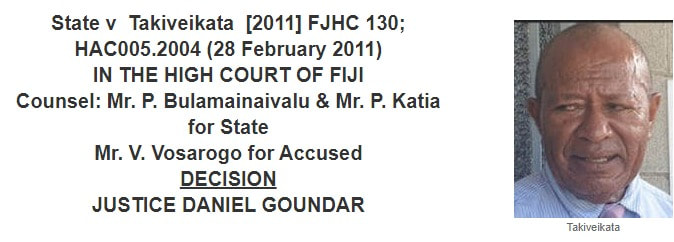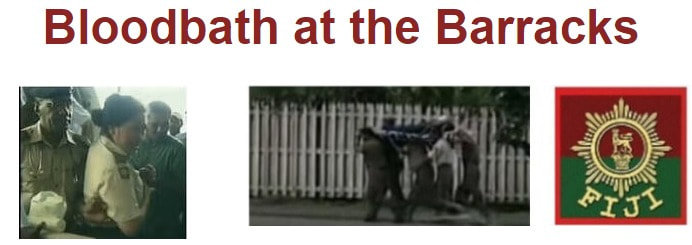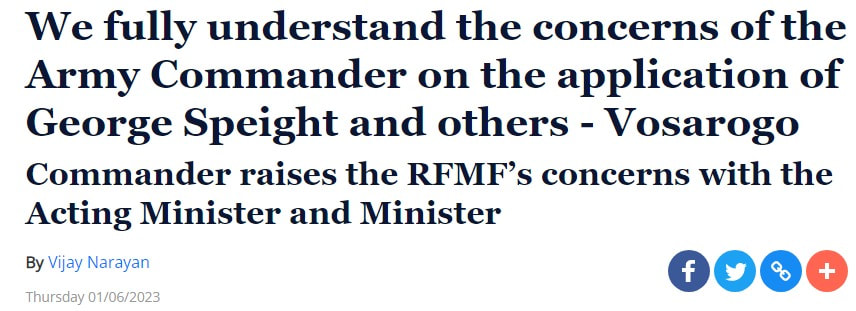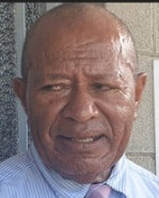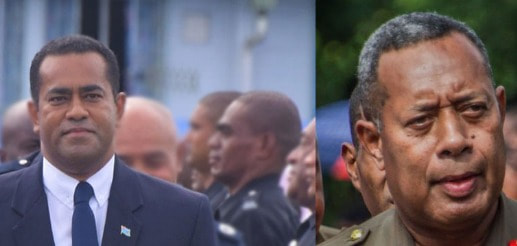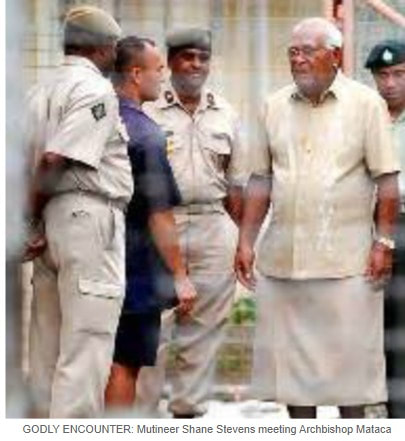Fijileaks, Coming soon: GEORGE SPEIGHT cannot be considered for freedom, for he CHOSE LIFE IMPRISONMENT instead of being HANGED by the NECK FOR TREASON. He cannot be pardoned twice for Treason.
On 18 February 2002 Speight pleaded guilty to treason and was sentenced to death. The sentence was commuted to life imprisonment the same day by the late President Ratu Josefa Iloilo
*SPOILED RATU SUKUNA DAY PARTY: Ratu Sukuna Day in 2000 was to be celebrated on 30 May, the death anniversary of Sukuna. The celebration was marred by Speight's coup on 19 May, which led to the dismissal of the Chaudhry government on 27 May. On Ratu Sukuna Day, Fijians of all races woke up to hear of the military takeover the night before, in the wake of the forced resignation of the President, Ratu Sir Kamisese Mara.
*We were shocked the GCC didn't apologise recently for colluding with George Speight and his criminal gangsters in the removal of Ratu Mara.
"In my mind what else could be a substantially grave offence than to incite a mutiny that resulted in deaths of soldiers and serious injuries to others. Your disaffection towards the Commander was a personal matter. You put others' lives at risk for your personal agenda...The title of Qaranivalu was bestowed to you to bring honour to your people. Instead you have brought them disgrace. Your action was deliberate and calculated. The consequences of your action were catastrophic. You expressed no remorse for your crime apart from your counsel's plea for mercy. Remorse is an expression of accepting responsibility for your conduct. You may have sought forgiveness from the victims, but forgiveness without accepting responsibility, is not a genuine acknowledgement of contrition. By not accepting any responsibility for your crime, you have deprived yourself of credit that is given to offenders who express remorse. In the exercise of my discretion I sentence you to life imprisonment."
Justice Daniel Goundar, sentencing Ratu Inoke Takiveikata
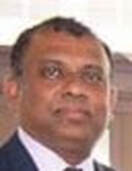 Justice Goundar
Justice Goundar Ratu Inoke Takiveikata, you stand before this court, convicted of inciting to mutiny after trial. I do not hold against you that you exercised your right to a trial. Like any other citizen, you were tried in accordance with the law.
You expressed no remorse for your crime apart from your counsel's plea for mercy. Remorse is an expression of accepting responsibility for your conduct. You may have sought forgiveness from the victims, but forgiveness without accepting responsibility, is not a genuine acknowledgement of contrition. By not accepting any responsibility for your crime, you have deprived yourself of credit that is given to offenders who express remorse.
Inciting to mutiny is a serious offence. A person convicted of this offence is liable to be imprisoned for life. The life imprisonment is discretionary.
The incitement that occurred in this case is serious. You urged two military officers belonging to CRW Unit to remove the Commander of RFMF by taking over the military barracks. One of the officers, Shane Stevens was a senior military officer who managed to team up a group of soldiers to turn against their own Commander.
On 2 November 2000, Stevens and his team attempted to takeover the military barracks. Soldiers loyal to the Commander resisted the takeover. There was a cross-fire exchanged between the loyalist and the rebellion soldiers at the military barracks.
As a result of the cross-fire, eight soldiers were killed, eighteen soldiers were hospitalized with serious gunshot injuries and two civilians were injured outside the barracks from stray projectiles.
In your first trial, you were sentenced by Gates J (as he was then) to life imprisonment for this office. His Lordship took the view that your sentence should not be any different from the sentence imposed on Stevens who you had incited. The plan to use CRW soldiers to remove the Commander was your brain child. The reason you targeted the CRW soldiers is because you already knew some of them had rebelled against the military authority during the George Speight coup.
In this re-trial, evidence was led that the strategy for the takeover was left to Stevens to devise. Bonafasio whom you also incited said in his evidence that you did not want any bloodshed. That may be so, but, you must have realised that forceful removal of the head of military authority cannot occur without resistance. Stevens disclosed to you the strategy he was going to use to execute the takeover and you agreed to provide arms and civilian support. You agreed to use your chiefly status as the Qaranivalu to gather support from your people to go to the barracks when Stevens was going to execute the takeover.
You may have been driven to incite Stevens because of concerns expressed to you by your people about the conduct of the military following signing of Muanikau Accord. You were a mediator between George Speight's group and the military for the release of hostages in parliament during May 2000. You felt you had to act when people approached you. Unfortunately you decided to venture into a dangerous path to remove the Commander by inciting his soldiers to resist his authority.
The title of Qaranivalu was bestowed to you to bring honour to your people. Instead you have brought them disgrace. Your action was deliberate and calculated. The consequences of your action were catastrophic.
Where the law simply provides a maximum sentence of life imprisonment, the court is given a very wide discretion to determine the appropriate penalty based on the facts of each case.
The offence of inciting to mutiny is rarely committed and there are no cases in Fiji, for guideline. Counsel for the State referred the court to a judgment of the Supreme Court of Papua New Guinea for guideline.
In my mind what else could be a substantially grave offence than to incite a mutiny that resulted in deaths of soldiers and serious injuries to others. Your disaffection towards the Commander was a personal matter. You put others' lives at risk for your personal agenda.
I am satisfied that your case meets the Hodgson guidelines. Firstly, the incitement is grave enough to attract a substantial sentence. Secondly, by inciting an offence to subvert the military authority using your prominence and influence as the holder of the title Qaranivalu, you might remain a serious danger to the public for a period which could not be reliably estimated at this stage. I say this because any rebellion among military will have dire consequences to the law and order in the country.
After the Court of Appeal allowed your appeal against conviction, you were released from prison in June 2007.
Following your release from prison on bail pending re-trial, you did not waste any time to embark on another unlawful course against the Commander. This time, you planned with the rebellion CRW soldiers, to kill the Commander who by that time had become the Prime Minister. The plot to kill the Commander was detected; you were charged and tried together with the CRW soldiers, and on 5 March 2010, sentenced to 7 years imprisonment for conspiracy to murder (State v. Takiveikata HAC009/2008).
Your subsequent offending is highly relevant. Further to my earlier finding that you continue to pose a serious threat to the public safety, your subsequent offending also leads me to believe that you might remain a serious danger to the public safety. Both general and special deterrence applies to your case.
For these reasons, in the exercise of my discretion I sentence you to life imprisonment.
At the time of the offending in this case you were 53 years old. You did not have any significant previous convictions before 2000. You are now 63 years old. I give weight to your good character before you offended in 2000 and the contributions you made to your people as their paramount chief.
The offence is nearly ten years old. I consider the age of the offence in your favour. I take into account that you had served two years and seven months before you were released on bail for this re-trial.
Your counsel informed this court that in 2007 you were diagnosed with prostate cancer and that in 2008 you had undergone a surgery.
I take all these matters into account to fix a non-parole period for 8 years. I order that you serve this sentence concurrently with your pre-existing sentence. Your sentence means that you will only be released from prison after 4 March 2019 on a license and will be subject of recall to continue serving your life imprisonment if you breach any conditions of your release.
You may appeal against your conviction and sentence with the leave of the Court of Appeal within 30 days.
Daniel Goundar
JUDGE
At Suva
4 March 2011
On appeal, the Fiji Court of Appeal upheld Takiveikata's conviction and sentence.
You expressed no remorse for your crime apart from your counsel's plea for mercy. Remorse is an expression of accepting responsibility for your conduct. You may have sought forgiveness from the victims, but forgiveness without accepting responsibility, is not a genuine acknowledgement of contrition. By not accepting any responsibility for your crime, you have deprived yourself of credit that is given to offenders who express remorse.
Inciting to mutiny is a serious offence. A person convicted of this offence is liable to be imprisoned for life. The life imprisonment is discretionary.
The incitement that occurred in this case is serious. You urged two military officers belonging to CRW Unit to remove the Commander of RFMF by taking over the military barracks. One of the officers, Shane Stevens was a senior military officer who managed to team up a group of soldiers to turn against their own Commander.
On 2 November 2000, Stevens and his team attempted to takeover the military barracks. Soldiers loyal to the Commander resisted the takeover. There was a cross-fire exchanged between the loyalist and the rebellion soldiers at the military barracks.
As a result of the cross-fire, eight soldiers were killed, eighteen soldiers were hospitalized with serious gunshot injuries and two civilians were injured outside the barracks from stray projectiles.
In your first trial, you were sentenced by Gates J (as he was then) to life imprisonment for this office. His Lordship took the view that your sentence should not be any different from the sentence imposed on Stevens who you had incited. The plan to use CRW soldiers to remove the Commander was your brain child. The reason you targeted the CRW soldiers is because you already knew some of them had rebelled against the military authority during the George Speight coup.
In this re-trial, evidence was led that the strategy for the takeover was left to Stevens to devise. Bonafasio whom you also incited said in his evidence that you did not want any bloodshed. That may be so, but, you must have realised that forceful removal of the head of military authority cannot occur without resistance. Stevens disclosed to you the strategy he was going to use to execute the takeover and you agreed to provide arms and civilian support. You agreed to use your chiefly status as the Qaranivalu to gather support from your people to go to the barracks when Stevens was going to execute the takeover.
You may have been driven to incite Stevens because of concerns expressed to you by your people about the conduct of the military following signing of Muanikau Accord. You were a mediator between George Speight's group and the military for the release of hostages in parliament during May 2000. You felt you had to act when people approached you. Unfortunately you decided to venture into a dangerous path to remove the Commander by inciting his soldiers to resist his authority.
The title of Qaranivalu was bestowed to you to bring honour to your people. Instead you have brought them disgrace. Your action was deliberate and calculated. The consequences of your action were catastrophic.
Where the law simply provides a maximum sentence of life imprisonment, the court is given a very wide discretion to determine the appropriate penalty based on the facts of each case.
The offence of inciting to mutiny is rarely committed and there are no cases in Fiji, for guideline. Counsel for the State referred the court to a judgment of the Supreme Court of Papua New Guinea for guideline.
In my mind what else could be a substantially grave offence than to incite a mutiny that resulted in deaths of soldiers and serious injuries to others. Your disaffection towards the Commander was a personal matter. You put others' lives at risk for your personal agenda.
I am satisfied that your case meets the Hodgson guidelines. Firstly, the incitement is grave enough to attract a substantial sentence. Secondly, by inciting an offence to subvert the military authority using your prominence and influence as the holder of the title Qaranivalu, you might remain a serious danger to the public for a period which could not be reliably estimated at this stage. I say this because any rebellion among military will have dire consequences to the law and order in the country.
After the Court of Appeal allowed your appeal against conviction, you were released from prison in June 2007.
Following your release from prison on bail pending re-trial, you did not waste any time to embark on another unlawful course against the Commander. This time, you planned with the rebellion CRW soldiers, to kill the Commander who by that time had become the Prime Minister. The plot to kill the Commander was detected; you were charged and tried together with the CRW soldiers, and on 5 March 2010, sentenced to 7 years imprisonment for conspiracy to murder (State v. Takiveikata HAC009/2008).
Your subsequent offending is highly relevant. Further to my earlier finding that you continue to pose a serious threat to the public safety, your subsequent offending also leads me to believe that you might remain a serious danger to the public safety. Both general and special deterrence applies to your case.
For these reasons, in the exercise of my discretion I sentence you to life imprisonment.
At the time of the offending in this case you were 53 years old. You did not have any significant previous convictions before 2000. You are now 63 years old. I give weight to your good character before you offended in 2000 and the contributions you made to your people as their paramount chief.
The offence is nearly ten years old. I consider the age of the offence in your favour. I take into account that you had served two years and seven months before you were released on bail for this re-trial.
Your counsel informed this court that in 2007 you were diagnosed with prostate cancer and that in 2008 you had undergone a surgery.
I take all these matters into account to fix a non-parole period for 8 years. I order that you serve this sentence concurrently with your pre-existing sentence. Your sentence means that you will only be released from prison after 4 March 2019 on a license and will be subject of recall to continue serving your life imprisonment if you breach any conditions of your release.
You may appeal against your conviction and sentence with the leave of the Court of Appeal within 30 days.
Daniel Goundar
JUDGE
At Suva
4 March 2011
On appeal, the Fiji Court of Appeal upheld Takiveikata's conviction and sentence.
Acting Home Affairs Minister, Filimoni Vosarogo says he fully understands the concerns of the Commander of the Republic of Fiji Military Forces, Major General Jone Kalouniwai on the application for release of George Speight and possibly others, and the timing of such discussions, especially as the nation begins to craft new beginnings with many rays of hope for a better Fiji still ahead of us.
Major General Kalouniwai confirmed to fijivillage News earlier today that the RFMF had raised their concerns this morning about George Speight and Ratu Inoke Takiveikata with Acting Minister Vosarogo and Minister for Home Affairs, Pio Tikoduadua.
However he says we can speak to the Minister and Acting Minister regarding their concerns.
When contacted by fijivillage News, Vosarogo says he thanks the Commander RFMF for bringing the concerns of the RFMF to him as the acting line minister and that shows the Commander’s commitment to the rule of law, cordiality, and mutual respect.
Vosarogo says he has reciprocated by assuring the Commander that the government will hear his views, work with him, and reference his opinions on issues of national security. The Acting Home Affairs Minister says the fact that George Speight and others may have already applied for presidential pardon is just one part of the process.
He says launching a petition requires a rigorous process of examination of character and rehabilitation.
Vosarogo says the constitution has safety gauges to ensure that no one received pardon who doesn’t deserve pardon.
He says the Mercy Commission for example, must receive a report of the trial judge or the chief justice (if the former is not available).
Vosarogo says the views of the victims should also be considered.
He says on the latter, he is sure that there would be wider consultation with security institutions who have had to bear the cost of the petitioner’s criminal actions.
Vosarogo says the Mercy Commission may also choose to dismiss a petition if it considers the application as frivolous, vexatious and without merit.
He says a petition for mercy is a recourse available to all persons convicted, not just a few but in the assessment of the petition, various considerations must be considered before the recommendation is taken to the President for the exercise of his powers.
Vosarogo says the initiation of a petition doesn’t automatically mean a release.
He says the process must be followed to the detail and the role of the Mercy Commission is to see to that detail being attended to.
The Acting Home Affairs Minister says in the meantime, the government will continue to liaise closely with the RFMF and the Fiji Police Force on law-and-order issues where necessary support is needed and receive advice from them on issues where it is needed. Source: Fijivillage News
Major General Kalouniwai confirmed to fijivillage News earlier today that the RFMF had raised their concerns this morning about George Speight and Ratu Inoke Takiveikata with Acting Minister Vosarogo and Minister for Home Affairs, Pio Tikoduadua.
However he says we can speak to the Minister and Acting Minister regarding their concerns.
When contacted by fijivillage News, Vosarogo says he thanks the Commander RFMF for bringing the concerns of the RFMF to him as the acting line minister and that shows the Commander’s commitment to the rule of law, cordiality, and mutual respect.
Vosarogo says he has reciprocated by assuring the Commander that the government will hear his views, work with him, and reference his opinions on issues of national security. The Acting Home Affairs Minister says the fact that George Speight and others may have already applied for presidential pardon is just one part of the process.
He says launching a petition requires a rigorous process of examination of character and rehabilitation.
Vosarogo says the constitution has safety gauges to ensure that no one received pardon who doesn’t deserve pardon.
He says the Mercy Commission for example, must receive a report of the trial judge or the chief justice (if the former is not available).
Vosarogo says the views of the victims should also be considered.
He says on the latter, he is sure that there would be wider consultation with security institutions who have had to bear the cost of the petitioner’s criminal actions.
Vosarogo says the Mercy Commission may also choose to dismiss a petition if it considers the application as frivolous, vexatious and without merit.
He says a petition for mercy is a recourse available to all persons convicted, not just a few but in the assessment of the petition, various considerations must be considered before the recommendation is taken to the President for the exercise of his powers.
Vosarogo says the initiation of a petition doesn’t automatically mean a release.
He says the process must be followed to the detail and the role of the Mercy Commission is to see to that detail being attended to.
The Acting Home Affairs Minister says in the meantime, the government will continue to liaise closely with the RFMF and the Fiji Police Force on law-and-order issues where necessary support is needed and receive advice from them on issues where it is needed. Source: Fijivillage News
RATU INOKE TAKIVEIKATA
Hearing Dates: 16 – 28 February 2011
Counsel: Mr. P. Bulamainaivalu & Mr. P. Katia for State
Mr. V. Vosarogo for Accused
DECISION
[1] Now that the trial has concluded, I have a matter concerning a witness in the trial to deal with. The State called Mr. Shane Stevens to give evidence. Mr. Stevens was convicted of the mutinous act of attempted takeover of QEB on 2 November 2000 and was sentenced to life imprisonment in a court martial.
[2] During the course of his testimony, Mr. Stevens was obstructive and showed contempt to the court. He willfully refused to answer questions by the State counsel even after a direction from me asking him to answer the questions. He responded to the questions by saying he could not recall even after his memory was refreshed from his written statement. I closely observed his demeanour when he was in the witness box. He expressed anger towards the institution of justice.
[3] His conduct leads me to conclude that he refuses to accept responsibility for his crime. He has no remorse for his actions.
[4] I direct the Chief Registrar to forward a copy of my findings and transcript of Mr. Steven's conduct at this trial to the Commissioner of Prisons for consideration if Mr. Stevens applies for parole or pardon in near future.
Daniel Goundar
JUDGE
At Suva
4 March 2011
Hearing Dates: 16 – 28 February 2011
Counsel: Mr. P. Bulamainaivalu & Mr. P. Katia for State
Mr. V. Vosarogo for Accused
DECISION
[1] Now that the trial has concluded, I have a matter concerning a witness in the trial to deal with. The State called Mr. Shane Stevens to give evidence. Mr. Stevens was convicted of the mutinous act of attempted takeover of QEB on 2 November 2000 and was sentenced to life imprisonment in a court martial.
[2] During the course of his testimony, Mr. Stevens was obstructive and showed contempt to the court. He willfully refused to answer questions by the State counsel even after a direction from me asking him to answer the questions. He responded to the questions by saying he could not recall even after his memory was refreshed from his written statement. I closely observed his demeanour when he was in the witness box. He expressed anger towards the institution of justice.
[3] His conduct leads me to conclude that he refuses to accept responsibility for his crime. He has no remorse for his actions.
[4] I direct the Chief Registrar to forward a copy of my findings and transcript of Mr. Steven's conduct at this trial to the Commissioner of Prisons for consideration if Mr. Stevens applies for parole or pardon in near future.
Daniel Goundar
JUDGE
At Suva
4 March 2011

